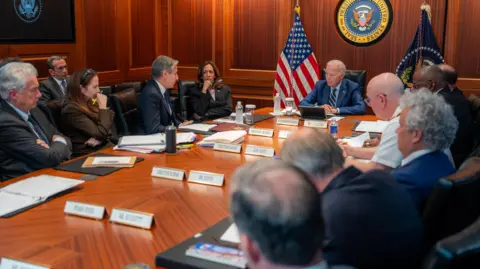
 White House/X
White House/XUS President Joe Biden met with his national security top brass on Monday, as fears grew of a possible Iranian retaliatory strike against Israel.
Mr Biden said he had been briefed on preparations to support Israel in the event of an attack, while Secretary of State Antony Blinken said officials were working “around the clock” to prevent an escalation.
Tensions have risen in the past week following the assassination of Hamas political leader Ismail Haniyeh, for which Iran has blamed Israel and vowed “harsh” retaliation. Israel has not claimed responsibility for the assassination.
Several countries, including the United States and the United Kingdom, have also they told their citizens to leave Lebanon, where there are fears that Hezbollah, an Iranian-backed militia and political movement, could play a role in any response.
Mr Blinken told his G7 counterparts in a call on Sunday that Iran and Hezbollah could launch an attack on Israel within 24 to 48 hours, according to comments cited by American news site Axios.
On Monday evening, Mr Biden said he and Vice President Kamala Harris had met with senior security officials to discuss the situation.
“We have received updates on the threats posed by Iran and its allies, diplomatic efforts to ease regional tensions, and preparations to support Israel should it be attacked again,” he said in a post on X, formerly Twitter.
He added that measures to defend US forces and respond to any attack on its personnel “in the manner and place of our choosing” were discussed, after Several US personnel were injured at a military base in Iraq on Monday.
Speaking to reporters this morning, Mr Blinken said officials were “engaged in intense diplomacy pretty much around the clock, with a very simple message: All sides must refrain from escalation.”
“Escalation is in no one’s interest. It will only lead to more conflict, more violence, more insecurity,” he said.
He added that a ceasefire “would unlock the possibility of a more lasting calm not only in the Gaza Strip, but also in other areas where the conflict could spill over.”
“It is urgent that all parties make the right choices in the hours and days ahead,” he said.
His comments came after Biden spoke with King Abdullah II of Jordan earlier in the day. They discussed “their efforts to de-escalate regional tensions, including through an immediate ceasefire and a hostage release agreement,” a White House statement said.
A joint statement by the G7 also expressed “deep concern at the high level of tension in the Middle East, which threatens to trigger a wider conflict in the region.”
“No country or nation stands to gain from further escalation in the Middle East,” he said.
Talks that had renewed hopes of a ceasefire deal to end the conflict in Gaza faltered after Haniyeh’s death, capping a week of rising tensions in the Middle East.
Things first got out of hand with the killing of 12 children and adolescents in an attack on the Israeli-occupied Golan Heights a few days ago. Israel blamed Hezbollah and vowed “severe” retaliation, although Hezbollah denied involvement.
Days later, Fuad Shukr, a senior Hezbollah military commander, was killed in an Israeli airstrike on a suburb of the Lebanese capital, Beirut. Four other people, including two children, were killed.
And a few hours later, Haniyeh was assassinated in Iran.
Iran’s Revolutionary Guard Corps (IRGC) said Haniyeh was killed in a “massive explosion” caused by a “short-range projectile” fired from outside a house where he was staying during a visit to the capital Tehran.
Israel has not commented on the death, but Israeli Prime Minister Benjamin Netanyahu said later that Israel had dealt “devastating blows” to Iran’s proxy groups in recent days.
Following the killings in Lebanon and Iran, the IRGC said Israel would receive “severe punishment at the appropriate time, place and manner,” while Hezbollah leader Hassan Nasrallah said the conflict had entered a “new phase.”
This is the closest the conflict has come to an escalation since April, when Iran has launched around 300 drones and missiles against Israel in response to the Israeli attack on the Iranian consulate in Syria, which killed several senior military commanders.
The conflict in Gaza began following the October 7 attack on Israel by Hamas and other militant groups, in which some 1,200 people were killed and 251 others were taken hostage back to Gaza.
According to the Hamas-led Health Ministry, more than 38,400 Palestinians have been killed since the beginning of Israel’s retaliatory ground invasion of Gaza.
Hundreds of people have been killed and tens of thousands have been displaced from their homes on both sides of the Israel-Lebanon border by almost daily attacks between Israeli forces and Hezbollah.
On Monday, Jordan asked all airlines planning to land at its airports to carry a 45-minute supply of fuel, a move seen as a precaution in case Jordan closes its airspace in the event of a regional conflict.
German flag carrier Lufthansa has suspended all flights to Tel Aviv, Tehran and Beirut until August 12 inclusive.
US airline Delta has also suspended flights to Tel Aviv until at least August 31 “due to the ongoing conflict in the region”.
The Foreign Office is currently advising against all travel to Lebanon and has urged British citizens in the country to leave.
It also advises against any travel to the northern part of Israel that borders Lebanon.
On Monday, Several US personnel were injured in a suspected missile attack on a U.S. military base in western Iraq.
U.S. officials have not yet said who they believe is behind the attack.





